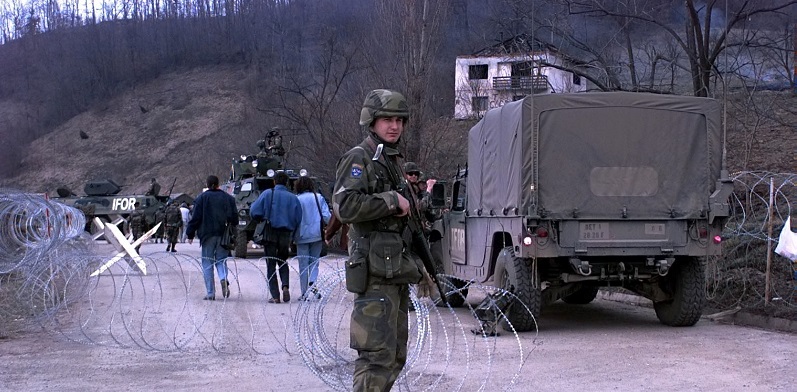In Sarajevo, from 29-31 October, the OSCE Mission to Bosnia and Herzegovina (BiH) partnered with the Bosnian Armed Forces and the Centre for Security Studies to organize an Advanced Security Sector Reform (SSR) course. The course was a continuation of the first introductory SSR course held in February 2013. The advanced course was designed to familiarize security stakeholders with a whole-of-government approach towards SSR and good governance in BiH.
The OSCE has been a key supporter of SSR in BiH, with a focus on governance development, arms control, democracy, and capacity building. At the Advanced Security Sector Reform CourseNina Suomalainen, Deputy Head of the OSCE Mission to BiH,said, “Security sector reform in BiH has already come a long way.” Suomalainen highlights the cooperation between various security actors, such as law enforcement, military, and ministries, while adding that work on SSR is never fully complete. Security is not just about military and physical security, Suomalainensays, other factors such as political decision making and civil society must be considered.
Deputy Head of Mission, Nina Suomalainen, on Security Sector Reform in Bosnia and Herzegovina:
The NATO intervention and the subsequent Dayton Peace Agreement in 1995 began the SSR process in BiH.At the top of the SSR agenda was reforming the military, which included establishing control over the excessive amounts of small, light, and heavy arms in the country, as well as the demobilization of armed forces. Other SSR programs in BiH include reforming the police, the judiciary, and customs and border services.Defense reform in BiH has generally been labelled a success. For example, in July 2006 the government approved the creation of the Armed Forces of Bosnia and Herzegovina, an integrated armed force that is comprised of the Bosnian Army of the Republic of BiH, the Bosnian Serb Army of Republika Srpska, and the Croat Defence Council. 2006 also marks the year BiH joined NATO’s Partnership for Peace.
At the same time, the 2013 report, Ten Years After: Lessons from the EUPM in Bosnia and Herzegovina 2002-2012 by the European Union Police Mission (EUPM) in BiH, states that while substantial progress has been made in developing the country’s police force, it is not enough for EU accession. The end of EUPM BiH’s mandate in 2012 marks an important transition for BiH authorities, forcing them to take ownership of SSR. The international community has been the main driver of SSR in BiH, and as such, a general lack of local ownership exists[1]. Ensuring the sustainability of SSR as international supports declines is key to securing the protection of BiH civilians and promoting the country’s accession to the European Union (EU).
The Bosnia and Herzegovina 2013 Progress Report by the European Commission states that in order for BiH to advance its accession to the EU, it must satisfy the Copenhagen political criteria, which includes stable institutions that guarantee democracy. The report describes BiH’s Constitution as inefficient and open to interpretation. Overall, agreement exists that constitutional reform is necessary in order for BiH to make the necessary changes to improve government structure (Perdan, 2008). However, disagreement exists on what those reforms should entail, and how they should be carried out. In regards to BiH’s Strategy for Fight Against Corruption 2009-2014, implementation at the state-level has been delayed. According to the European Commission, BiH has made limited progress in the fight against organized crime and terrorism. The country continues to be a source of “arms and ammunitions for criminal groups”, and gaining control over loose weapons should be an integral part of current SSR practices. Other sources oforganized crime include human trafficking, money laundering, and illicit drug trafficking. Compounding the problem is the fact that little progress has been made in the area of human rights in BiH; rule of law, and the country’s judicial system, are particularly problematic.
Nonetheless, great effort is being undertaken to advance SSR. On November 7, 2013 a Security Agreement was signed between Serbia, Montenegro, and BiH. The agreement emphasizes continued regional cooperation, with a focus on organized crime, terrorism, and the security of citizens. Serbian Prime Minister Ivica Dacic said: “Individually, our capacities are rather limited, but together, our voice is stronger.” At a Security Council meeting in November 2013, the High Representative for BiH Valentin Inzko said that international assistance is further required in BiH. This resulted in Resolution 2123(2013), which maintains the involvement of the European Union Force Althea for another year to ensure the military implementation of the Dayton Peace Agreement. The challenge for BiH is to maintain the positive developments that have been made in SSR, while advancing local ownership to further the SSR process.
[1]See Perdan, Slobodan. “Bosnia: SSR under International Tutelage.” In Local Ownership and Security Sector Reform, edited by Timothy Donais, 253-270. Geneva: Geneva Centre for the Democratic Control and Armed Forces – DCAF LIT, 2008.
Anni-Claudine Buelles is a Research and Communications Intern with the Security Governance Group
Tags: Bosnia-Herzegovina, EU, SSR




 Visit the Centre for
Visit the Centre for